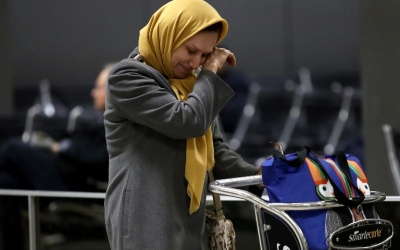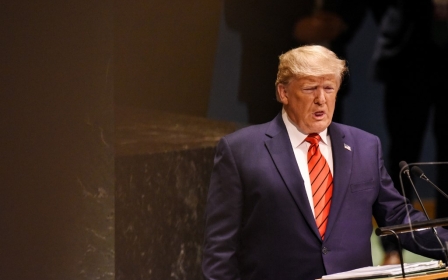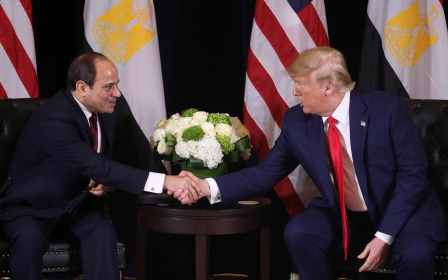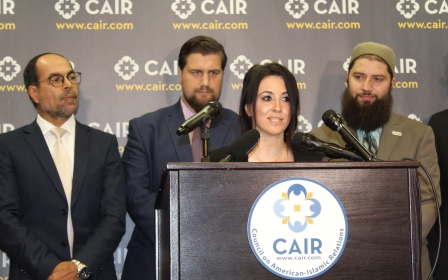Victims of Trump's Muslim ban share stories in first hearing before Congress
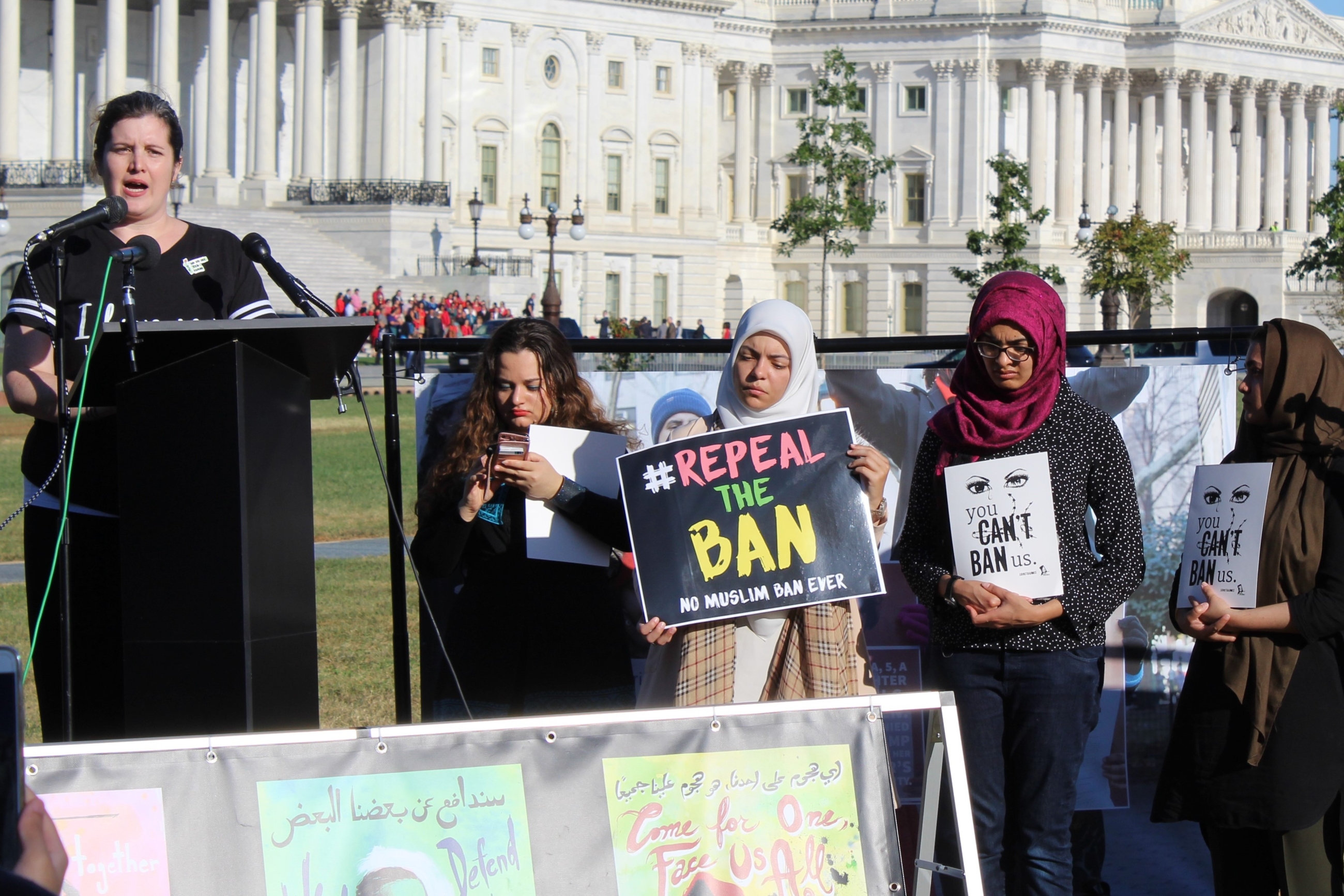
Jessica Breitschwerdt is an American teacher. She is pregnant. For her first ultrasound, her Iranian husband may not be by her side because of President Donald Trump's Muslim ban.
Before Congress held its first formal hearing on the ban on Tuesday, Breitschwerdt urged lawmakers to "stop keeping families apart".
"They need to stop judging people based on the country that they were born in - that they don't have any control over," Breitschwerdt told Middle East Eye.
The teacher's husband currently lives in Spain. They have been married since March 2018. At a news conference early on Monday, she struggled to hold back tears as she described the different ways the ban has affected the couple, including creating a feeling of uncertainty over the fate of the family.
New MEE newsletter: Jerusalem Dispatch
Sign up to get the latest insights and analysis on Israel-Palestine, alongside Turkey Unpacked and other MEE newsletters
The Muslim Ban has not made us safer. It has weakened our standing in the world and runs contrary to our country’s moral and philosophical foundation
- Jerry Nadler, congressman
"That constant pain of 'what if' puts such a strain on both of us," she said.
Breitschwerdt is one of thousands of Americans separated from their loved ones because of the ban. Days after his inauguration early in 2017, Trump signed an executive order banning travelers from several Muslim-majority countries.
As a candidate in December 2015, Trump had called for a "total and complete shutdown" on Muslims entering the United States.
Critics say that campaign pledge is proof of the discriminatory intent of his executive order.
After several iterations of the ban and numerous decisions against it by lower courts, the Supreme Court ruled in Trump's favour last year, upholding his executive order as constitutional.
Waivers
Republicans who largely rebuked Trump on his 2015 ban proposal have largely fallen in line behind the US president's immigration policies. Still, Democrats have introduced several bills to undo the executive order, including the No Ban Act, which aims to limit the president's authority to restrict the entry of people into the US based on nationality.
In a hearing described as "historic" by Muslim-American advocates, lawmakers heard on Tuesday testimonies from administration officials, immigration experts and people affected by the executive order.
While administration officials argued that the ban was to protect US national security, lawmakers grilled them over the lack of waivers granted for visa applicants from Muslim countries targeted by the executive order.
When weighing the legality of Trump's ban, the Supreme Court emphasised that the presidential proclamation still allows visas to citizens of banned country via waivers.
"If the Government is not applying the Proclamation’s exemption and waiver system, the claim that the Proclamation is a 'Muslim ban,' rather than a 'security-based' ban, becomes much stronger," the justices wrote.
Still, figures from late last year show that only 5 percent of applicants have been granted waivers since the ban came into effect.
Congresswoman Pramila Jayapal, a Democrat from the state of Washington, noted that Venezuela and North Korea - which were included on the third iteration of the ban - have a much higher rate of waivers than Muslim-majority countries on the list.
For example, only 1.3 percent of Iranian applicants were granted waivers for the ban, compared to 72 percent of North Koreans.
"So by definition, Muslim-majority countries are being discriminated against, unless you believe that all of the people in those countries somehow deserve that kind of very, very low waiver approval rate," Jayapal said.
US State Department official Edward Ramotowski said the number of waivers has increased significantly over the past few months as immigration authorities have implemented an expedited process for security checks.
"Consular officers determine on a case-by-case basis if an applicant is eligible for a waiver, based on the following criteria: issuance of the visa is in the national interest; denial of the visa would cause the applicant undue hardship; and the applicant poses no national security or public safety threat to the United States," Ramotowski said in his testimony.
But while Ramotowski was insisting that numbers were improving, lawmakers heard from people who are still being victimised by the ban.
Abdollah Dehzangi, a professor at Morgan State University in Maryland, has been waiting for his wife's visa application to process since 2016.
His wife, who completed her PhD in 2018, lives in Australia and is unable to join him to start a new life in the United States.
Dehzangi, who is a US permanent resident, said Iranians in the US are bearing the brunt of the ban.
"People who came to the United States to start a new life in this wonderful country, and like many others have strived to make their new home a better place, yet we have been banned for no reason other than where we were born and what religion we practice," he told legislators.
Republican congressman invokes 9/11
Democratic lawmakers have been warning that the ban does not only cause suffering to people like Dehzangi, but it also diminishes US status internationally.
"The Muslim Ban has not made us safer. It has weakened our standing in the world and runs contrary to our country’s moral and philosophical foundation," said top Democrat Jerry Nadler.
"The United States has always been, and must continue to be, a place that welcomes and embraces people of all religions and nationalities."
Republican legislators slammed Trump's critics during the hearing, stressing that the ban was about national security.
Congressman Andy Biggs invoked 9/11, bemoaning that the hearing came shortly after the attacks' anniversary, accusing Democrats of attempting to "sow discord" among Americans.
None of the 9/11 hijackers came from the countries included in the ban. In fact, most of the militants were from Saudi Arabia, a chief ally of the Trump administration.
Not everyone in the discriminated class has to be discriminated against in order for something to be discriminatory
- Pramila Jayapal, congresswoman
"Maybe we need a refresher on the fact that the 9/11 terrorists submitted 23 visa applications to the United States government, of which 22 were approved", Biggs said.
He added that the executive order only applies to a small portion of Muslims, an argument that Jayapal dismissed.
"I want to make it clear to everyone, that not everyone in the discriminated class has to be discriminated against in order for something to be discriminatory," the Democratic congresswoman said.
On Sunday, dozens of former US security officials and diplomats - some of whom served under Trump - penned a letter to Congress stressing that the ban does not make the country safer.
"Through the years we have worked individually and collectively to develop national security policies that have responded to specific, credible threats based on individualised information; have rested on the best available intelligence; and have been subject to thorough interagency review," the letter said.
"The Bans do not rest on such carefully tailored grounds, but rather are overbroad, blanket entry prohibitions based on national origin."
Middle East Eye delivers independent and unrivalled coverage and analysis of the Middle East, North Africa and beyond. To learn more about republishing this content and the associated fees, please fill out this form. More about MEE can be found here.


